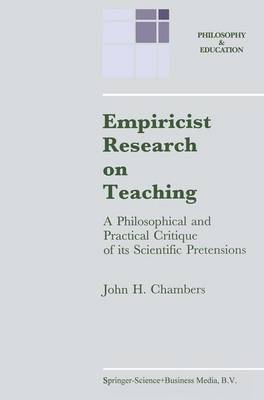Philosophy and Education
1 total work
v. 4
This book suggests the novel thesis that there has been a pervasive misunderstanding in research on teaching. In attempting to be scientific, researchers have been empiricist. Moreover, because they have used a very restricted kind of empiricist method, their results have been only moderately useful. Thus, present-day empiricist research needs to be radically modified. Through a consideration of various kinds of theory, and through case studies, the contrast between scientific and empiricist research is drawn -- such as the difference between abstract and general concepts, and scientific and statistical experiments. Aiming at professional researchers and graduate students of research on teaching, the author argues that pedagogical researchers can try to make their work scientific, by creating scientific theory, which amongst other things interrelates abstract concepts in propositions interpretable to the world of sense experience -- but this is an immensely difficult task. Or, much more realizable, researchers can embed their work in a practical theory of pedagogy, one which takes account of the real world of teaching and the many kinds of theory currently ignored.
In short, it is more realistic for pedagogical researchers to forego their scientific ambitions, to continue on their empiricist way, and to make piecemeal improvements. About the author. John H. Chambers has worked at the City University of New York, the Tasmanian State institute of Technology and at the University of London Institute of Education.
In short, it is more realistic for pedagogical researchers to forego their scientific ambitions, to continue on their empiricist way, and to make piecemeal improvements. About the author. John H. Chambers has worked at the City University of New York, the Tasmanian State institute of Technology and at the University of London Institute of Education.
